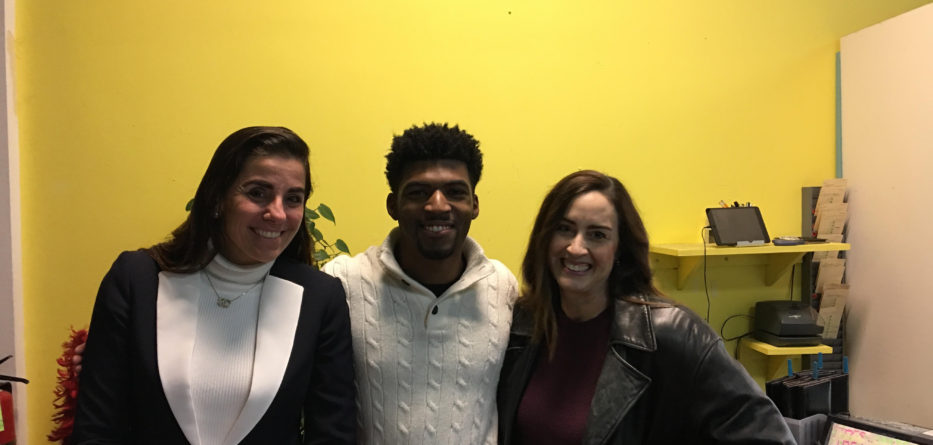Mental health focused factr strives to unite immigrants and community through
cultural exchange and art
Arturo Hilario
El Observador
Through focus on the mind and spirit, a nonprofit in San Jose is helping immigrants assimilate to their local communities all while celebrating their differences.
Family Alliance for Counseling Tools and Resolution, or factr as it’s abbreviated, is an organization that uses art, meditation, and mental health care as tools to help immigrants and refugees in the Bay Area cope with life changes and adversity of post-migration environments.
Psychotherapist Karita M. Hummer is the President and Clinical Director of factr, and says that the goal of their work is, “restoring spirit essentially, through clinical and community psychology approaches, macro and micro mental health.”
This approach to providing services is not new, but certainly differentiates with other services in the Bay Area which instead might focus on assistance with emergency needs such as shelter, food, clothing etc.
To Hummer, factr’s approach is important in how it benefits the immigrant and refugee community by engaging them on the mental health level. “I think mental health is not just in an office, it’s also what you do in a community. Community building, awareness, on behalf of immigrants, so that they feel empowered and also that there is recognition and welcoming that the larger community can provide. So I do see that as both essential for their mental health and the promotion of their well being.”
Hummer has been in the field a long time, at first working with Bosnian refugees in the 1990’s. “I just got a sense of what it means to be struggling in a new country and I myself am a child of an immigrant, my father came in 1903 I do understand the importance in helping immigrants in their adjustment here.”
The services offered at factr include their Immigrant Hardship Center, which includes the mental health area which focuses on the evaluation and assistance of clients, as well as legal aid protected by the 6th amendment. “That’s the purpose of factr, we have focused strongly on issues of ‘forensic mental health’, what I consider evaluations on behalf of immigrants who are needing the most assistance, that have the most difficulty around legal stressors, such as immigration status, and providing assessments for them in combination with immigration attorneys.”
The forensic mental health evaluations include assessments, forensic evaluations, by clinicians, mental health providers, counseling, and case management. It’s within this concentration that recent programs that focus on social justice and education through art and theater were developed.
“It’s really three pillars that we focus on. Clinical, childhood initiatives and cultural inspiration and cultural awareness,” says Hummer.
The theater project, called Theater for Empowerment and Advocacy (TEA), focuses on DACA (Deferred Action for Childhood Arrivals ) recipients and those that are curious about what it offers. Through collaborative, “devised theater”, the participants tell the stories of immigrants and DACA recipients, their experiences and struggles. The theater productions had their rollout on Friday January 13th at Tres Amigos Taco Shop in San Jose.
Hummer adds that the idea formed while looking at how the “Teatro Campesino” began in the Central Valley. “They got started by going into the fields and actually did flatbed stage theater. The idea being that they could engage the farm workers through theater. We had devised the idea that theater was a way of engaging that potential DACA recipient who might be a little threatened and afraid to come out of the shadows and apply for DACA. The idea was that we could kind of show them success stories that we’ve been collecting of Dreamers and we’re dramatizing their success stories. To kind of show this is possible, this is what you do.”
And even under the new presidential administration, and with DACA in limbo, Hummer advises people to seek out options and listen to the stories of those that have lived through and gotten DACA.
“Now it’s more or less for people that do have DACA, the Dreamers, encouraging them to renew and to be a witness to those who have gotten DACA and be a validating witness for theater for them, and then to actually educate the larger community as to the importance of DACA, and what the stressors have been.”
Along with their mental health services and legal aide, Hummer feels the addition of the Theater for Empowerment and Advocacy to their offerings will allow another form of access to not only those needing these services, but those in the community that can learn from it.
“I think theater is a very powerful way of educating people, both to open up the heartstrings of the larger community, I didn’t realize how much our society still needed that, to a certain extent, but I think we’re all much more aware now of how much it’s needed,” she says.
With this project Hummer aims to help the community at large in understanding the perils and motivations behind immigrants and their families, as well as to bring in immigrants and refugees who may need help through mental health, arts and humanities.
“It’s the direct DACA recipients themselves and their stories, and to educate the broader community so their hearts are more open to what others are living through. So we can promote more compassion in the community, through theater.”
More information on the services at factr and how you can help can be found at factr.org.






